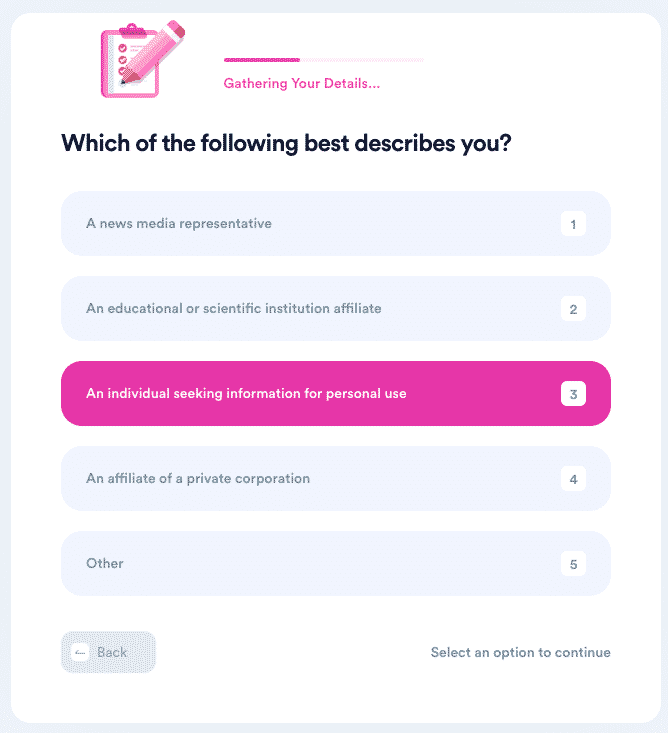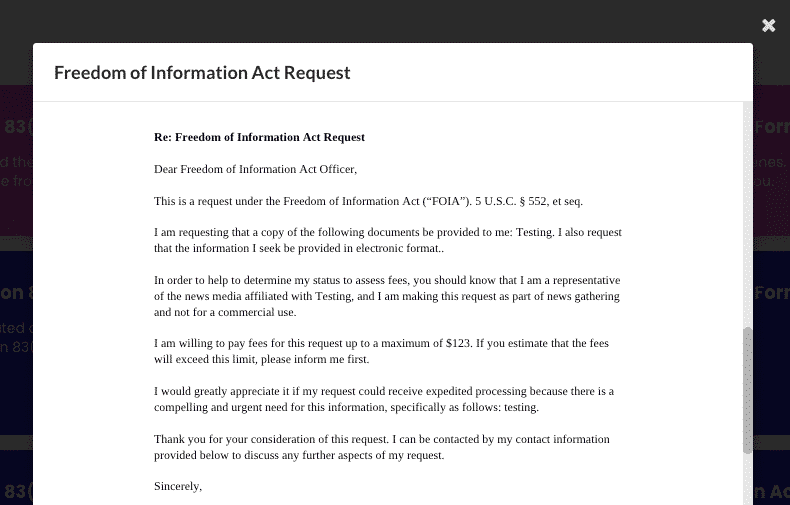Everything You Need To Know About the FDA FOIA Rules
The Freedom of Information Act of 1966 states that the general public can access most of any federal agency’s documents, including those of the U.S. Food and Drug Administration (FDA). Giving the public insight into the workings of federal agencies helps to raise awareness of government processes.
If you want to file an FDA FOIA request, you will need a thorough knowledge of the FDA FOIA regulations. Learn how to write a compelling FOIA request letter to the FDA, CIA, FBI, IRS, or any other federal agency!
What Are the FOIA FDA Regulations?
The most frequently requested FDA records are available in the FDA electronic reading rooms. You should check the FDA website to see if the documents you need have already been published.
If you can't locate a specific document on their website, you can write and submit a FOIA request letter to the FDA. Bear in mind that, by the FOIA, FDA can provide only existing records. The agency is not obligated to create new ones to comply with your request.
Before you submit your letter, you must be sure that the record doesn’t fall under the FOIA specified exemptions. The six exemptions that most often cause the FDA to withhold information involve:
- FDA’s internal rules and practices records
- All information protected from disclosure by other laws
- Trade secrets and commercial and financial information
- Specific inter-and intra-agency communication
- Medical or personnel information that could constitute an invasion of privacy
- Law enforcement-related records that could, if disclosed:
- Compromise the identity of a confidential source
- Jeopardize someone’s right to a fair trial
- Interfere with enforcement proceedings
- Disclose techniques of law enforcement practices
- Endanger an individual’s life or physical safety
The Cost of Processing Your FDA FOIA Request
The FDA requires you to pay a total or a part of the charges for processing your FOIA request. You should state in your FOIA request letter the maximum amount you are willing to cover. The FDA will contact you if the expenses exceed the amount you indicated in your request. You will have to pay in advance if the fee is more than $250.
The common fees that come with FDA FOIA requests are:
| Requestor Category | Fee |
|
Commercial use requestors |
|
|
Representatives of the news media, public interest groups, and educational and noncommercial scientific institutions |
|
|
Consumers |
|
FDA includes the standard charge of $5.75 in commercial and other requesters' invoices. You can pay by check or money order. For more information on payment methods, consult the FDA website.
What Should an FDA FOIA Request Form Look Like?
FDA doesn’t provide a request form that you can fill out and send. It offers guidelines for writing your request letter. If you want to make sure the FDA reviews your request in record time, you must follow a certain procedure and comply with all FDA regulations.
Your FOIA request letter must include the following information:
- Your personal information—name, address, and telephone number
- Description of the desired record—more specific information will result in a quicker response and a lower fee
- Fee information—a brief statement concerning your willingness to pay a fee and the amount you consent to
If you are having trouble drafting a letter, FOIA request templates can be helpful.
How To File an FDA FOIA Request by Yourself
FDA offers a few ways to submit your request letter. Take a look at the submission methods in the table below:
| The Method of Filing an FDA FOIA Request Letter | Details |
|
By mail |
Food and Drug Administration Division of Freedom of Information Office of the Executive Secretariat, OC 5630 Fishers Lane, Room 1035 Rockville, MD 20857 |
|
Via fax |
|
|
Online |
|
File an FDA Freedom of Information Act Request With DoNotPay
If you don’t feel like dealing with the administrative mumbo-jumbo, use DoNotPay! We will save you the stress of writing your own request letter and wondering if the FDA will find the records you need.
We use the information you give us to write the FOIA request letter and submit it in your name. You only need to open DoNotPay in your and:
- Enter FOIA into DoNotPay’s search box
- Type in the information about you, the agency, and the format you want your documents to arrive in
- Choose to get a fee waiver or expedited processing
- Submit the request

Use our app to discover the meaning of the FOIA and even file a FOIA request on yourself! We can also teach you how to check your FOIA request status or file an appeal if it gets denied.
If you want to file a FOIA request in states such as Michigan, Virginia, or North Carolina, we can help!

DoNotPay Leads the Way Against Spammers
Browsing the internet has never been more popular than today, but you must not forget to keep your private and financial information safe. You know you can cancel any streaming service or magazine subscription easily, but that won't stop them from using your personal details for marketing purposes.
DoNotPay has a solution for that!
Is a company pestering you with incessant robocalls, spam emails and text messages? Use our Virtual Credit Card to catch them in the act and claim compensation for your troubles.
To prevent that from happening ever again, use our card to sign up for free trials—not only will you not pay a dime for the service, but you will be automatically unsubscribed as soon as the trials are up!
If you want to avoid revealing your personal phone number, we'll generate a temporary burner phone for you so the company won't have any way to reach you.
Already Been Scammed? DoNotPay Knows the Way!
If you've already made the mistake and divulged your personal info to the wrong party or experienced any other kind of crime or injustice, you don't have to sit tight and suffer the consequences. DoNotPay can assist you in taking anyone to small claims court!
We'll help you gather evidence—correspondence proving stalking or harassment took place, customer service call recordings, denied chargeback and refund claims, online fax transcripts, or proof of copyright violation. Then, we'll fill out the relevant documents for you and draft a court script that you can use in your hearing.


